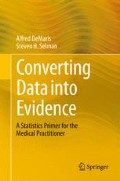Abstract
Linear regression is a widely applicable modeling tool, but it is not appropriate when the correct model should be nonlinear in the parameters. Such is the case when the study endpoint is a binary variable. The model becomes nonlinear because what is being modeled is the probability that a case experiences the event of interest or that a case is in a particular category of the binary response. As a probability must fall between 0 and 1, the linear regression model cannot accommodate it. In this chapter, we examine this important principle, develop the logistic regression model as an alternative, and consider several examples of this modeling strategy from the research literature.
Access this chapter
Tax calculation will be finalised at checkout
Purchases are for personal use only
References
Abouassaly, R., Alibhai, S. M. H., Tomlinson, G. A., Urbach, D. R., & Finelli, A. (2011). The effect of age on the morbidity of kidney surgery. The Journal of Urology, 186, 811–816.
Anton, H. (1984). Calculus (2nd ed.). New York: Wiley.
Crawford, E. D., Moul, J. W., Rove, K. O., Pettaway, C. A., Lamerato, L. E., & Hughes, A. (2011). Prostate-specific antigen 1.5–4.0 ng/mL: A diagnostic challenge and danger zone. BJU International, 108, 1743–1749.
DeMaris, A. (2002). Explained variance in logistic regression: A Monte Carlo study of proposed measures. Sociological Methods & Research, 31, 27–74.
DeMaris, A. (2004). Regression with social data: Modeling continuous and limited dependent response variables. Hoboken, NJ: Wiley.
Flensner, G., Ek, A., Soderhamn, O., & Landtblom, A. (2011). Sensitivity to heat in MS patients: A factor strongly influencing symptomology – an explorative survey. BMC Neurology, 11:27.
Hosmer, D. W., & Lemeshow, S. (2000). Applied logistic regression (2nd ed.). New York: Wiley.
Liu, R., Guo, X., Park, Y., Huang, X., Sinha, R., Freedman, N. D., et al. (2012). Caffeine intake, smoking, and risk of Parkinson disease in men and women. American Journal of Epidemiology, 175, 1200–1207.
Long, J. S. (1997). Regression models for categorical and limited dependent variables. Thousand Oaks, CA: Sage.
Wilhelm-Leen, E. R., Hall, Y. N., deBoer, I. H., & Chertow, G. M. (2010). Vitamin D deficiency and frailty in older Americans. Journal of Internal Medicine, 268, 171–180.
Author information
Authors and Affiliations
Rights and permissions
Copyright information
© 2013 Springer Science+Business Media New York
About this chapter
Cite this chapter
DeMaris, A., Selman, S.H. (2013). Logistic Regression. In: Converting Data into Evidence. Springer, New York, NY. https://doi.org/10.1007/978-1-4614-7792-1_7
Download citation
DOI: https://doi.org/10.1007/978-1-4614-7792-1_7
Published:
Publisher Name: Springer, New York, NY
Print ISBN: 978-1-4614-7791-4
Online ISBN: 978-1-4614-7792-1
eBook Packages: Mathematics and StatisticsMathematics and Statistics (R0)

